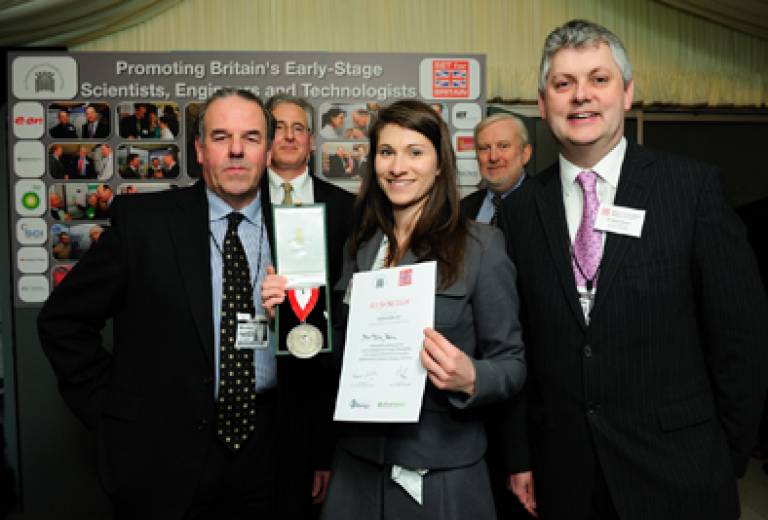UCL researchers take gold and silver for science in Parliament
18 March 2011
Talia Atkin, a researcher at UCL Research Dept of Neuroscience, Physiology and Pharmacology, has struck gold at a competition in the House of Commons for the excellence of her scientific research.

Talia's research, which looks at the underlying causes of schizophrenia, was judged against 59 other shortlisted biologists' work. At the same event, Jay Stone, a researcher at UCL Institute of Ophthalmology, was awarded silver for research which looks at LBP in eye disease.
Both Talia and Jay presented their research to more than one hundred politicians and a panel of expert judges, as part of SET for Britain, on 14 March.
SET for Britain is a competition in the House of Commons which involves researchers displaying posters of their work to panels of expert judges and more than 100 MPs. The event aims to help politicians understand more about the UK's thriving science base and rewards some of the strongest scientific research being undertaken in the UK.
Talia, who plans to spend some of her £3,000 prize on a new laptop to write up her PhD thesis, said: "I am very honoured to have won such a prestigious award. The winner was chosen based on scientific merit and on the clarity of science communication. I think both of these are very important for the future of science so I am particularly pleased to have been awarded this prize. I'd like to thank the MRC for funding my PhD, and the whole neuroscience community at UCL, particularly my supervisor Dr Josef Kittler, for providing such a positive environment in which to carry out my research."
Dr Kittler, Senior Research Fellow in the Research Department of Neuroscience, Physiology & Pharmacology, said: "I am truly delighted that Talia's hard work and exciting results have been recognized by this prestigious award."
Jay, who plans to use the £2,000 prize money to take a holiday to Borneo after she has finished her thesis, said: "I'm thrilled, my PhD was really tough at the beginning so to get to my final year and be awarded a prize at such a prestigious event is very rewarding."
Professor Stephen Moss, Ashton Chair of Biomedical Research and Jay's supervisor, said: "I would like to take this opportunity to congratulate Jay; this is a highly prestigious award; and it reflects the outstanding quality of her work."
Dr Mark Downs, Chief Executive from the Society of Biology, explained: "Science has the potential to provide solutions for many of the global challenges we face. It is critical that parliamentarians better understand how science can help and that young researchers more fully understand the reality of policy formation. These awards provide a fantastic platform for that to happen."
The Parliamentary and Scientific Committee ran the event in collaboration with The Royal Academy of Engineering, The Institute of Physics, the Society of Biology, The Royal Society of Chemistry and the Society of Chemical Industry, with financial support from BP, E.ON, plantimpact, The Institution of Engineering and Technology, International Agri-Technology Centre Ltd, AgChem Access, Eli Lilly and Oxford Instruments.
Image 1 (left-right): Peter Blezard (CEO, Plant Impact plc, the company which sponsored the Gold Award); Stephen Benn, Royal Society of Chemistry; Talia Atkin; Andrew Miller MP; and then Dr Mark Downs, CEO of the Society of Biology.
Image 2 (left-right): Andrew Miller MP; Paula Twinn (manager of IATC, the company which sponsored the Silver Award); Dr Stephen Benn, Royal Society of Chemistry; Jay Stone; and Dr Mark Downs, Chief Executive, Society of Biology.
 Close
Close

